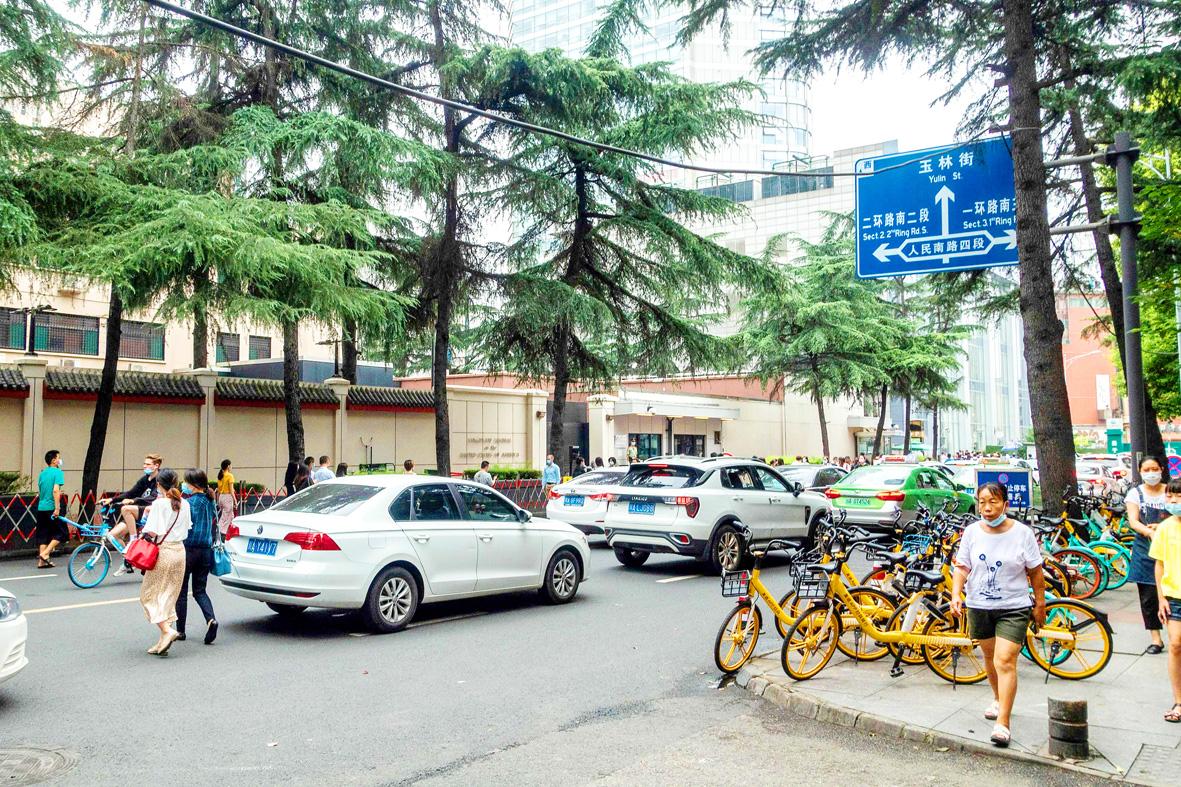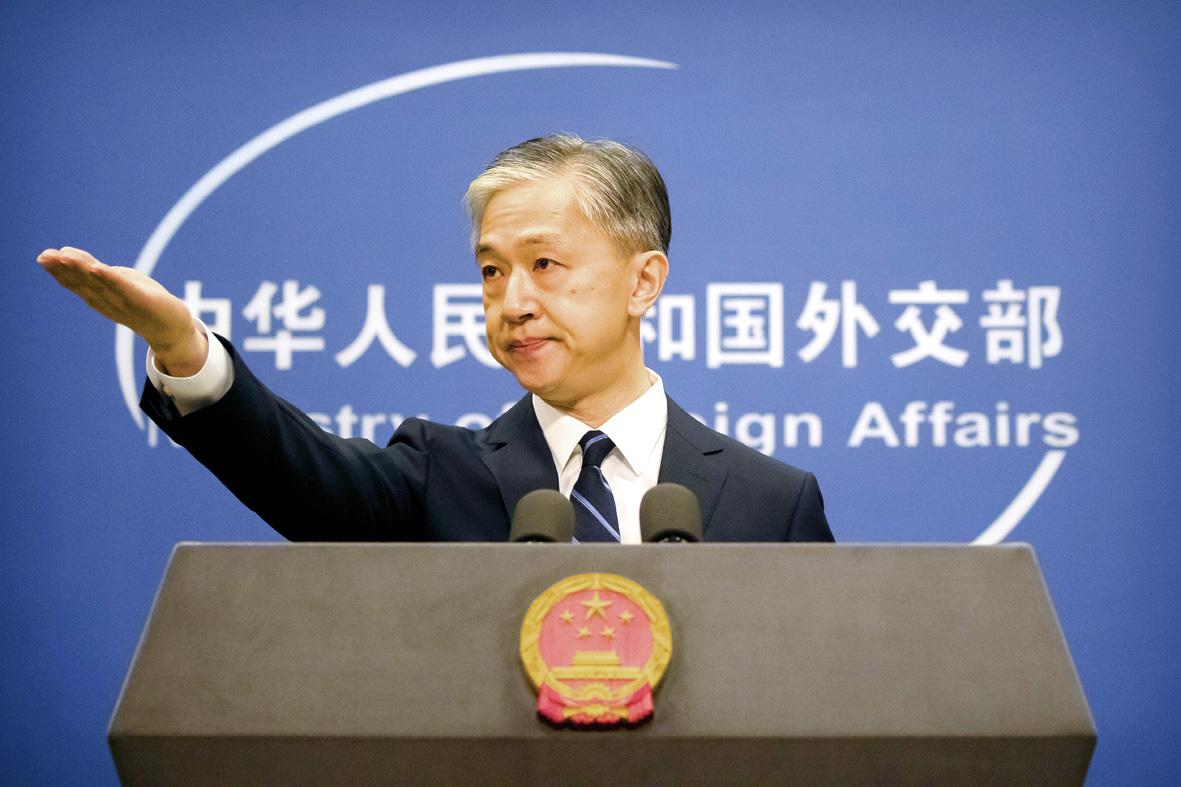China yesterday ordered the US to close its consulate in Chengdu after the administration of US President Donald Trump earlier this week told Beijing to close its consulate in Houston after Washington accused Chinese agents of trying to steal medical and other research in Texas.
“The measure taken by China is a legitimate and necessary response to the unjustified act by the United States,” Chinese Ministry of Foreign Affairs spokesperson Wang Wenbin (汪文斌) said.
“The current situation in Chinese-US relations is not what China desires to see. The United States is responsible for all this,” Wang said. “We once again urge the United States to immediately retract its wrong decision and create necessary conditions for bringing the bilateral relationship back on track.”

Photo: AFP
Wang said some consulate personnel “interfered in China’s internal affairs and harmed China’s security interests,” but gave no details.
Beijing complained “many times” to Washington about that, he said.
Meanwhile, the US Department of State sent out a notice warning Americans in China of a “heightened risk of arbitrary detention.”

Photo: AP
“US citizens may be subjected to prolonged interrogations and extended detention for reasons related to ‘state security,’” the notice said.
Americans might be detained or deported for “sending private electronic messages critical” of the Chinese government, it said.
The notice gave no indication of what prompted the warning.
The US has an embassy in Beijing and consulates in five other cities: Shanghai, Guangzhou, Chengdu, Shenyang and Wuhan. It also has a consulate in Hong Kong.
The consulate in Chengdu is responsible for monitoring Tibet and other areas in the southwest inhabited by non-ethnic Chinese minorities.
“Alongside the eviction of the Houston Chinese Consulate, the risk of the US-China conflict escalating into a ‘Cold War’ is worrying,” Hayaki Narita of Mizuho Bank said in a report.
Wang also said that a speech on Thursday by US Secretary of State Mike Pompeo on China disregarded reality and was filled with ideological bias.
Pompeo said that US engagement with China was a dismal failure.
Speaking at the Richard Nixon Presidential Library in Yorba Linda, California, Pompeo said that the former US president’s good and noble intentions in opening China to the world had come to naught and must be abandoned.
Nearly 50 years after Nixon’s 1972 trip to China, Pompeo used the symbolism of the venue to accuse Beijing of taking advantage of that opportunity to lie, cheat and steal their way to power and prosperity.
Pompeo called for the free world to “induce” change in China, making an overt appeal for a new coalition of democratic nations to force the Chinese Communist Party change direction or face isolation.
Pompeo said that Western engagement with China could not continue as it has.
“The free world must triumph over this new tyranny,” he said in speech to an invited audience that included exiled Chinese dissidents. “The old paradigm of blind engagement with China simply won’t get it done. We must not continue it. We must not return to it.”
Pompeo called on nations to induce change in the CCP’s behavior, “because Beijing’s actions threaten our people and our prosperity.”
“If the free world doesn’t change communist China, communist China will surely change us,” he said. “There can be no return to past practices because they’re comfortable, or because they’re convenient.”
“The kind of engagement we have been pursuing has not brought the kind of change in China that President Nixon hoped to induce,” Pompeo said. “The truth is that our policies — and those of other free nations — resurrected China’s failing economy, only to see Beijing bite the international hands that fed it.”
Wang told a daily news conference in Beijing that China urged the US to discard the “Cold War mentality.”

FREEDOM OF NAVIGATION: The UK would continue to reinforce ties with Taiwan ‘in a wide range of areas’ as a part of a ‘strong unofficial relationship,’ a paper said The UK plans to conduct more freedom of navigation operations in the Taiwan Strait and the South China Sea, British Secretary of State for Foreign, Commonwealth and Development Affairs David Lammy told the British House of Commons on Tuesday. British Member of Parliament Desmond Swayne said that the Royal Navy’s HMS Spey had passed through the Taiwan Strait “in pursuit of vital international freedom of navigation in the South China Sea.” Swayne asked Lammy whether he agreed that it was “proper and lawful” to do so, and if the UK would continue to carry out similar operations. Lammy replied “yes” to both questions. The

‘OF COURSE A COUNTRY’: The president outlined that Taiwan has all the necessary features of a nation, including citizens, land, government and sovereignty President William Lai (賴清德) discussed the meaning of “nation” during a speech in New Taipei City last night, emphasizing that Taiwan is a country as he condemned China’s misinterpretation of UN Resolution 2758. The speech was the first in a series of 10 that Lai is scheduled to give across Taiwan. It is the responsibility of Taiwanese citizens to stand united to defend their national sovereignty, democracy, liberty, way of life and the future of the next generation, Lai said. This is the most important legacy the people of this era could pass on to future generations, he said. Lai went on to discuss

AMENDMENT: Climate change is expected to increase the frequency of high-temperature days, affecting economic productivity and public health, experts said The Central Weather Administration (CWA) is considering amending the Meteorological Act (氣象法) to classify “high temperatures” as “hazardous weather,” providing a legal basis for work or school closures due to extreme heat. CWA Administrator Lu Kuo-chen (呂國臣) yesterday said the agency plans to submit the proposed amendments to the Executive Yuan for review in the fourth quarter this year. The CWA has been monitoring high-temperature trends for an extended period, and the agency contributes scientific data to the recently established High Temperature Response Alliance led by the Ministry of Environment, Lu said. The data include temperature, humidity, radiation intensity and ambient wind,

SECOND SPEECH: All political parties should work together to defend democracy, protect Taiwan and resist the CCP, despite their differences, the president said President William Lai (賴清德) yesterday discussed how pro-Taiwan and pro-Republic of China (ROC) groups can agree to maintain solidarity on the issue of protecting Taiwan and resisting the Chinese Communist Party (CCP). The talk, delivered last night at Taoyuan’s Hakka Youth Association, was the second in a series of 10 that Lai is scheduled to give across Taiwan. Citing Taiwanese democracy pioneer Chiang Wei-shui’s (蔣渭水) slogan that solidarity brings strength, Lai said it was a call for political parties to find consensus amid disagreements on behalf of bettering the nation. All political parties should work together to defend democracy, protect Taiwan and resist